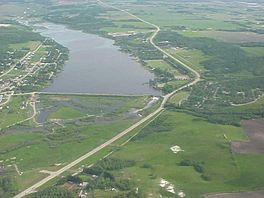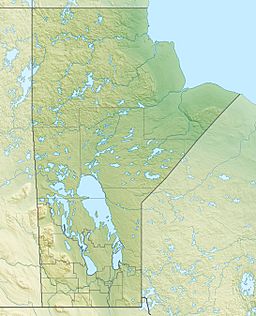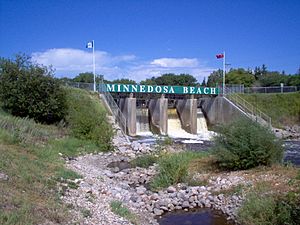Minnedosa Lake facts for kids
Quick facts for kids Minnedosa Lake |
|
|---|---|
 |
|
| Location | Rural Municipality of Minto / Minnedosa, Manitoba |
| Coordinates | 50°15′56″N 99°49′32″W / 50.26556°N 99.82556°W |
| Lake type | artificial lake |
| Basin countries | Canada |
| Max. length | 1.86 miles (2.99 km) |
| Max. width | 1,475 feet (450 m) |
| Surface area | 233 acres (0.94 km2) |
| Max. depth | 20 feet (6.1 m) |
| Water volume | 1,720 acre⋅ft (2,120,000 m3) |
| Shore length1 | 4.3 miles (6.9 km) |
| Surface elevation | 1,681.0 m (5,515.1 ft) |
| Settlements | Minnedosa, Manitoba |
| 1 Shore length is not a well-defined measure. | |
Minnedosa Lake is a lake in Manitoba, Canada. It's a special kind of lake because it's man-made, meaning people built it! It was created between 1910 and 1912 to hold water for a power plant.
Today, Minnedosa Lake is a super popular spot for fun activities like boating and swimming. It's even known as one of the best places in Canada for rowing competitions. The lake was the location for the rowing events during the 1999 Pan American Games. Water flows into the lake from the Little Saskatchewan River.
Building the Lake: A Look at History
The idea for building a dam here was approved by the Canadian government in December 1907. After a few delays, the dam was finally finished in 1912. This was a big deal for Minnedosa! It became the second community in Manitoba to make its own electricity from water power.
Powering the Town
At first, a private company owned the power plant. But in 1920, the Manitoba Power Commission took over. The dam provided electricity for the town until 1933. Besides power, the lake was also a source of water for the town itself. It was also used for fun activities and to supply water for the trains of the Canadian Pacific Railway.
Dam Repairs and Updates
On May 4, 1948, a part of the dam called the spillway broke. This happened because the structure had worn away over time. When the spillway failed, it caused a flood that damaged many homes and businesses in the town. The spillway was fixed in 1950 by a group called the Prairie Farm Rehabilitation Administration.
 | Delilah Pierce |
 | Gordon Parks |
 | Augusta Savage |
 | Charles Ethan Porter |



